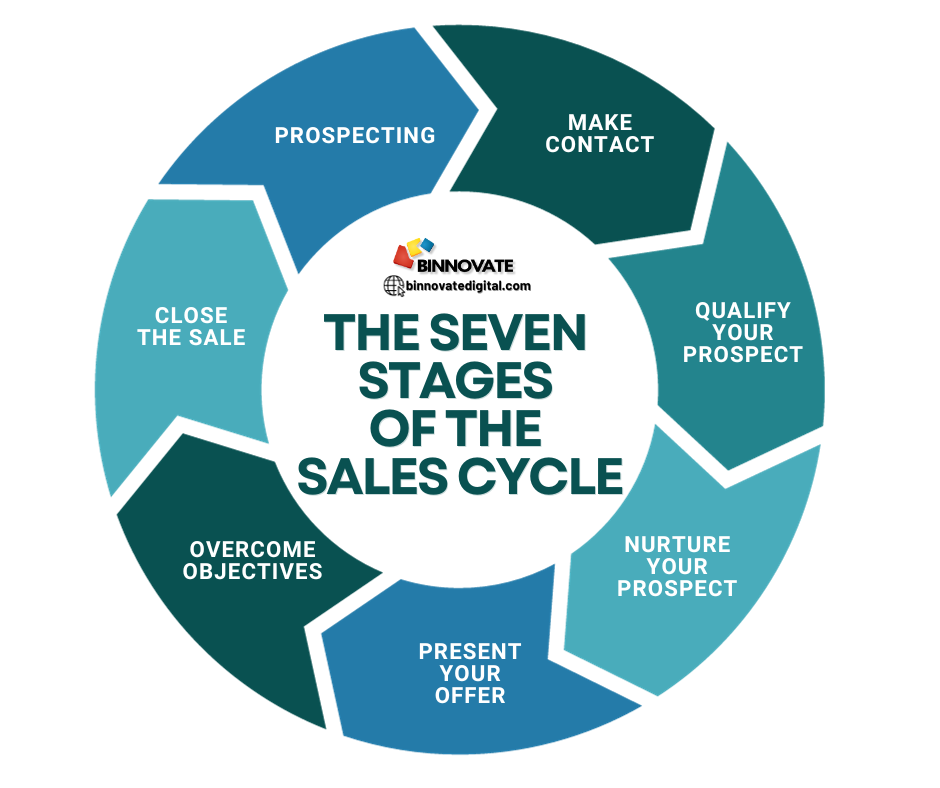Selling to healthcare organizations can be daunting due to the healthcare industry's unique complexities and intricacies. One major challenge businesses face is the extended sales cycle, which can significantly slow down decision-making and hinder revenue growth.
At Binnovate Digital, we understand the unique challenges of selling to healthcare organizations. The sales cycles in the medical device and digital health industries are notoriously long, and it can be frustrating for companies looking to make a sale. That's why we've developed a specialized service to help healthcare companies navigate these challenges and achieve their sales goals more efficiently.
In this article, we will explore the reasons why sales cycles in the healthcare industry are incredibly long and discuss strategies to overcome this challenge and streamline the sales process.
The Healthcare Sales Cycle

The healthcare sales cycle has seven general stages. The healthcare sales journey revolves around the following:
- Identifying and Targeting Prospects: Research and identify potential clients who match your Ideal Customer Profile (ICP) in the healthcare industry. Consider factors such as size of the organization, budget, decision-makers, and geographic location.
- Building Connections: Once you've identified your target healthcare prospects, learn how to reach them best. Methods that work include email, LinkedIn, Facebook, or other social media platforms where you can engage with them. As always, humility and sincerity go a long way.
- Qualifying Leads: Healthcare professionals are inundated with unsolicited sales and marketing messaging nowadays. To distinguish your healthcare sales offering, you need to develop trust early in the conversation. During this stage, ask relevant open-ended questions about your prospect's healthcare organization' needs, priorities, concerns, and goals. This will help you understand if you are a good fit, thereby saving you both time and resources.
- Nurturing Prospects: Healthcare sales cycles are notoriously long and complex. They are also relationship-driven. During this phase, focus on adding value to your prospects by being a resource to them in their daily professional lives. Share with them industry news or developments that might affect their operations or strategy. You are nurturing the relationship and keeping your brand top-of-mind for when the time is right for them to make a decision.
- Presenting Your Offer: When you've established a rapport, introduced your brand, followed up, and answered some questions, the prospect may want to know more about your healthcare solutions. Be prepared to provide relevant examples, testimonials, and case studies that illustrate your expertise and the value your product/service provides.
- Overcoming Objections: The healthcare industry is heavily regulated and subject to intense scrutiny. There will be objections, questions, and pushback from prospects as they carefully weigh the benefits of your offering against the risks involved. Engage gently and professionally to identify the root cause of concern, then address it with data and expert knowledge.
- Closing the Sale: When you have made it to this stage, congratulations - you've made it to the final stage of the healthcare sales cycle. Now that you've helped the healthcare prospect see the value in your offering and resolved any objections or questions, it's time to seal the deal. Be sure to offer a clear path to implementation and follow-through with an accountability plan to ensure a successful partnership.
Sales Cycles for Various Digital Health and Medical Device Solutions
Here are some examples of average sales cycles for digital health and medical device solutions that Binnovate Digital has worked on:
- Sales for a pill crusher medical device in Hospital Pharmacy workflow – 90-120 days days
- Sales for an AI orthopedic outpatient management - 5-7 months
- Sales for a Nephrology remote patient monitoring and education module to a health system - 6-8 months
- Sales for a pilot for a nephrology workflow campaign for a dialysis clinic - 3-4 months
- Sales for an Ophthalmology technician training service for $500/month - 2-4 weeks
The Complex Healthcare Environment
The healthcare industry operates within a web of interconnected stakeholders and decision-makers, making the sales process more intricate. The involvement of multiple departments, such as procurement, finance, and legal teams, can contribute to delays in the decision-making process. Understanding this complex ecosystem and navigating through various levels of decision-makers is crucial to overcoming these hurdles.
Emphasis on Patient Care
Healthcare organizations prioritize patient care above all else. Every purchase decision directly impacts patient outcomes and well-being, making healthcare executives more cautious and deliberate when considering new solutions or partnerships. This focus on patient care adds more scrutiny to the decision-making process, resulting in longer sales cycles.
Stringent Regulatory Requirements
The healthcare industry is heavily regulated, and compliance with various laws and regulations is essential for any product or service being introduced into this market. Healthcare organizations must ensure that any solution they purchase meets stringent standards, creating additional steps and time-consuming processes within the sales cycle.
High Cost and Budget Constraints
Another factor contributing to lengthy sales cycles in the healthcare industry is the significant cost associated with healthcare solutions. Healthcare organizations have limited budgets and must carefully evaluate the return on investment before making a purchase decision. Extensive financial analysis, budget approvals, and cost-effectiveness assessments prolong the sales cycle.
Decision-Making Hierarchies
Healthcare organizations often have hierarchical decision-making structures, with multiple layers of approvals required for significant purchases. Engaging and convincing each stakeholder within this structure is time-consuming and can significantly extend the sales cycle. Building relationships and nurturing trust with key decision-makers is crucial for success.
Overcoming the Challenges
While the healthcare sales landscape can be complex, several strategies can help businesses overcome the obstacles in sales cycles:
Establishing Expertise
Position yourself as an expert in the healthcare industry by showcasing your knowledge and understanding of its unique challenges. This positions your organization as a trusted partner and helps build credibility among healthcare executives, facilitating decision-making.
Targeted Prospect Research
Invest time in identifying the right prospects within the healthcare market. This involves thoroughly researching and understanding their specific pain points, challenges, and priorities. Tailor your messaging and value proposition to address these specific needs, increasing the chances of capturing their attention and expediting the sales cycle.
Cultivating Relationships
Building strong relationships with healthcare executives and decision-makers is crucial. Engage with key stakeholders through personalized communication, educational content, and targeted marketing campaigns. Nurturing trust and credibility over time can accelerate decision-making, as healthcare executives are more likely to buy from organizations they trust.
Streamlining Information Sharing
Simplify the information-sharing process by providing clear and concise documentation, case studies, and testimonials showcasing the success of your solution in similar healthcare settings. Providing the necessary evidence and data upfront can help healthcare organizations make informed decisions more efficiently.
Collaboration with Internal Champions
Identify internal champions within healthcare organizations who believe in your solution and can advocate for its adoption. Collaborating with these champions can help bridge the gap between various stakeholders and expedite decision-making.
If you are a sales executive, you can split your sales and marketing team into three: Hunters, Closers, and Farmers.

In the world of B2B healthcare sales, there are three key roles that play a vital role in driving successful outcomes: hunters, closers, and farmers. When implemented effectively, these roles can help healthcare companies generate leads, close deals, and cultivate long-term customer relationships.
- Hunters:
Hunters are the front-line sales professionals who actively seek out and identify potential customers in the healthcare industry. They are skilled at prospecting, reaching out to new leads, and initiating conversations. Hunters are responsible for conducting thorough research to understand their target market, identifying ideal customer profiles, and generating a pipeline of prospects. Their primary goal is to uncover new opportunities and establish initial contact with potential buyers. - Closers:
Closers are sales professionals who excel in the art of persuasion and negotiation. Once hunters have identified qualified leads, closers take charge of the sales process and work towards closing the deal. They possess strong communication skills, product knowledge, and the ability to address customer concerns. Closers build trust with potential buyers, articulate the value proposition of their product or service, and position it in a way that aligns with the needs of healthcare organizations. Their ultimate goal is to secure signed agreements and convert prospects into paying customers. - Farmers:
While hunters and closers focus on acquiring new customers, farmers specialize in cultivating and nurturing existing customer relationships. They play a crucial role in generating repeat business, upselling or cross-selling additional products or services, and ensuring customer satisfaction. Farmers act as a dependable point of contact for customers, providing ongoing support, addressing any issues, and maintaining regular communication. By building strong relationships with healthcare organizations, farmers contribute to customer retention and promote brand loyalty.
Long, unpredictable, and expensive sales cycles
The unpredictable and lengthy sales cycles associated with traditional methods of healthcare prospecting can be a nightmare for companies. With lengthy purchasing processes, companies often struggle to stay afloat in the current market dynamics and face the risk of falling behind competitors. Furthermore, due to the high costs associated with healthcare, any mistakes in the prospecting process can be extremely costly.
Thus, breaking through these barriers requires a well-strategized approach that aligns with the specific requirements of stakeholders and decision-makers and communicates the unique value proposition effectively.
Optimize Your Sales and Prospecting Process
Although there are ways to adapt to the long sales cycles in the healthcare industry, there is little you can do to actually shorten it. However, having Binnovate Digital as your partner proves to be a great advantage.
We strive to empower clients by optimizing their inside prospecting and sales process. We understand that your time is valuable, and your sales team's interactions should focus on engaging with prospects who are not only pre-qualified but also genuinely interested in what you offer.
Here’s how we make that possible:
Efficient Prospecting
By leveraging data-driven insights, we identify and target prospects who align with your ideal customer profile. This strategic approach ensures that your team is reaching out to individuals or organizations with a genuine need for your products or services.
Streamlined Sales Process
With pre-qualified and warmed-up prospects, your sales team can focus on what they do best—closing deals. We provide them with the tools, insights, and support they need to make the sales process smoother and more efficient. This translates into shorter sales cycles and higher conversion rates.
Precise Qualification
Our process includes a comprehensive qualification system. Prospects are assessed based on criteria that matter most to your business. This step ensures that your sales team engages with leads more likely to convert, maximizing the return on their efforts.
ROI-Based Partnership
Before entering into a partnership, we thoroughly evaluate your business, goals, and previous case studies. We assess whether our services align with your needs. This enables us to determine if we have a strong potential for a successful collaboration.
Get Pre-Qualified Leads Through a Proven Prospecting Method
While sales cycles are incredibly long, understanding the unique dynamics of the healthcare industry and implementing targeted strategies can help streamline the process. By establishing expertise, nurturing relationships, and addressing specific pain points, businesses can overcome challenges and reduce the time it takes to close deals in the healthcare market.
With our effective prospecting system and expertise in selling to healthcare, we understand the unique dynamics and intricacies involved. Our AI-assisted outreach team and proprietary Healthcare Sales Operating Playbook, the "CMO Method," allow us to generate pre-qualified leads and expedite sales.
Say goodbye to wasted time and resources, and say hello to double the leads and appointments in 6-8 weeks. Trust us to deliver a cost-efficient, ROI-driven go-to-market strategy that guarantees a return on your investment in 6-10 months. Don't let the daunting sales cycles hold you back. Contact us now to help you achieve your sales goals quickly and efficiently.
